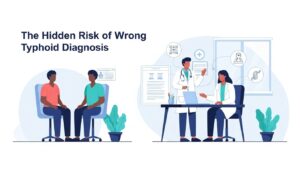Uterine fibroids, also called leiomyomas or myomas, are non-cancerous growths that develop in or around the uterus. These muscular and fibrous tissue masses can range from tiny seedlings to large tumours that distort your uterus. Surprisingly, up to 80% of women develop fibroids by age 50, yet many remain unaware of their presence due to a lack of symptoms.
What Are Uterine Fibroids?
Uterine fibroids are benign tumours that can significantly impact a woman’s reproductive health. They are remarkably common, affecting a substantial percentage of women by the age of 50.
Types of Fibroids: Location Matters
Understanding the different types of fibroids is crucial for managing your reproductive health:
- Intramural Fibroids: The most common type, nestled within the uterine wall.
- Submucosal Fibroids: These troublemakers grow into the uterine cavity and can significantly impact fertility.
- Subserosal Fibroids: Located on the outer uterine wall, they can grow large without necessarily affecting fertility.
- Pedunculated Fibroids: Resembling mushrooms, these fibroids grow on slender stalks attached to the uterus.
What Causes Fibroids?
While the exact cause remains a mystery, several factors may contribute to fibroid development:
- Hormonal Imbalance: Elevated oestrogen and progesterone levels can fuel fibroid growth.
- Genetic Predisposition: Some women may inherit a higher risk of developing fibroids.
- Growth Factors: Insulin-like growth factors and other hormones may play a role.
Recognizing Fibroid Symptoms
Many women with fibroids experience no symptoms. However, if you’re dealing with any of the following, fibroids might be the culprit:
- Heavy, prolonged periods (aka menorrhagia)
- Irregular spotting between periods
- Pelvic pressure or pain
- Frequent urination
- Lower back pain
- Constipation
- Pain during intercourse
If these symptoms sound familiar, it’s time to consult your gynecologist. They may perform a pelvic exam, ultrasound, or hysteroscopy to diagnose fibroids.
Fibroids and Fertility: A Complex Relationship
For women trying to conceive, fibroids can present unique challenges:
- Fallopian Tube Obstruction: Fibroids may block sperm or fertilised eggs from reaching their destination.
- Uterine Cavity Distortion: Submucosal fibroids can alter the uterine shape, making implantation difficult.
- Reduced Blood Flow: Fibroids may decrease blood supply to the uterine lining, affecting embryo implantation.
While most women with fibroids can still conceive, those with submucosal fibroids face a higher risk of infertility. If you’re struggling to get pregnant, discussing fibroid treatment options with your doctor is crucial.
Navigating Pregnancy with Fibroids
Many women with fibroids experience uncomplicated pregnancies. However, hormonal changes during pregnancy can cause fibroids to grow, potentially leading to:
- Placental Abruption: A rare but serious condition where the placenta detaches from the uterus.
- Fetal Growth Restriction: Large fibroids may limit space in the uterus, affecting fetal development.
- Preterm Labour: Fibroid-related pain and contractions can trigger early labour.
Close monitoring by your healthcare provider is essential for managing these risks.
Treatment Options: Finding Relief
The good news? Fibroids don’t always require treatment. When symptoms interfere with your quality of life or fertility, several options are available:
- Medications: Hormonal therapies and NSAIDs can help manage symptoms.
- Surgery: Procedures like myomectomy (fibroid removal) or hysterectomy (uterus removal) may be considered for severe cases.
- Minimally Invasive Procedures: Techniques such as uterine artery embolization or MRI-guided focused ultrasound can effectively shrink fibroids.
Your doctor will help you choose the best treatment based on your symptoms, fertility goals, and overall health.
Taking Control of Your Reproductive Health
Uterine fibroids may be common, but they don’t have to control your life or fertility. By understanding the types, causes, symptoms, and treatment options, you can make informed decisions about your reproductive health.
Remember, regular check-ups and open communication with your healthcare provider are essential for managing fibroids effectively. If you’re experiencing symptoms or have concerns about your fertility, don’t hesitate to seek professional advice.
Your reproductive health journey is unique, and with the right information and support, you can navigate the challenges of fibroids with confidence. You’re not alone in this journey – millions of women face similar challenges, and there’s a wealth of resources and treatments available to help you thrive.
Have you or someone you know experienced fibroids? Share your story with us and join the conversation about women’s health.
Contact Well-Life Hospital
At Well-Life Hospital, a renowned infertility treatment centre located at No. 12 Atbara Street, Wuse 2, Abuja, FCT, we are dedicated to providing compassionate and comprehensive care to help you on your journey to parenthood. To learn more about our IVF services and to book a consultation, visit our website or contact us today.
- Website: welllifehospital.com
- Instagram: @welllifehospital
- Facebook: Well Life Hospital
- Twitter: @Well_Life_H
- TikTok: @welllifehospital
- YouTube: Well Life Hospital
- Mobile : +234 906 000 4314
… Your wellbeing is our goal






